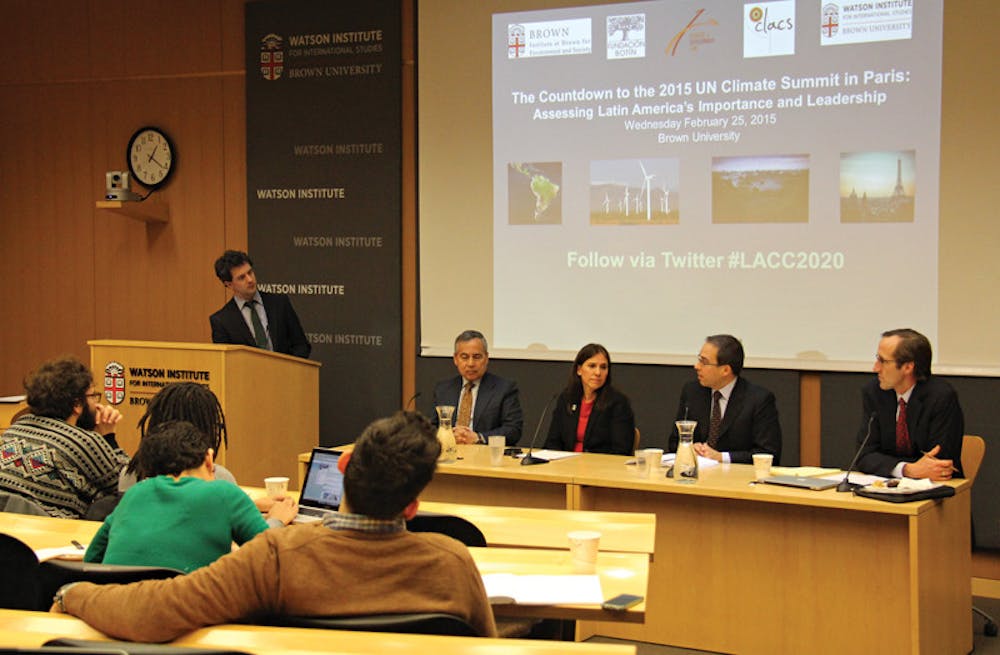Updated on February 26, 2015 at 8:35 p.m.
In anticipation of the 2015 United Nations Climate Change Conference, which will be held in Paris in December, speakers from various institutions gathered at the Joukowsky Forum of the Watson Institute for International Studies Wednesday to discuss the progress of climate change efforts in Latin America.
The panelists included Walter Vergara, senior fellow at the World Resources Institute, Mariana Panuncio, director of climate change at the World Wildlife Fund, Jorge Gastelumendi, senior policy adviser at The Nature Conservancy and J. Timmons Roberts, professor of environmental studies and sociology. The event was organized by the Center for Latin American and Caribbean Studies and the University’s climate and development lab, funded by the Fundacion Botin and moderated by Guy Edwards, research fellow and co-director of lab.
Edwards opened the discussion by asking all of the panelists what they believe to be the significance of climate change awareness.
“It’s not an understatement to say that what’s at the stake is the future of our planet,” Panuncio said. “By that I mean for every human being as well as every life form. We know that the trajectory that we’ve been in, in terms of emissions, basically puts us on a path that’s unsustainable, that is likely to have deep and irreversible impacts on the planet.”
In addition to stressing the perils climate change poses for the planet, the panelists delved into the importance of Latin America’s role in global efforts.
“Latin American countries have increased their influence at the U.N. climate change negotiations fairly remarkably. And (they) began to offer solutions on both coping with global warming and reducing emissions, taking a low-carbon pathway to economic development,” Roberts said.
But there are also great challenges facing Latin American countries, Edwards said, adding that the political and economic landscapes have to be taken into consideration. Many factors could potentially impede the success of the climate movement: the generally poor economic conditions of Latin American nations, the fragmentation of the entire region, the unwillingness of many nations to prioritize climate issues and the power dynamics between major stakeholders who have different visions of balancing climate actions and prosperity, he said.
Many panelists said this year marks a crucial moment for the history of climate change action. In previous climate negotiations, countries agreed to publicly outline by March which actions they intend to take before the Paris climate summit. This agreement is known as Intended Nationally Determined Contributions. By the December summit, the nations committed to put a final stamp on a new international climate agreement with specific goals, according to the World Resources Institute.
The collective global efforts would be tallied up to examine whether they fit in the global objective of limiting the average global temperature rise to 2 degrees Celsius, according to the WRI. Vergara said countries are struggling with the agreement, and implementing its proposals could pose difficulties.
For Latin American nations, “tackling climate change can be a win-win for securing climate and development objectives,” Edwards said.
Panuncio said she agreed that Latin America should collectively be a key player in climate talks. “When we talk about climate change, we are talking about not an environmental challenge, we are talking about it as a developmental challenge,” she said.
“What needs to happen is that we basically need to reengineer our economy,” she added. “We need to change the structure of our economy from a economy that has been driven by fossil fuels to one that is powered by renewable energy, one that maintains natural capital and one that prepares all sectors of the economy for the impacts that are already here and the impacts that are coming.”





